
Regensburg is a city in eastern Bavaria, at the confluence of the Danube, Naab and Regen rivers, Danube's northernmost point. It is the capital of the Upper Palatinate subregion of the state. With more than 150,000 inhabitants, Regensburg is the fourth-largest city in the State of Bavaria after Munich, Nuremberg and Augsburg. From its foundation as an imperial Roman river fort, the city has been the political, economic and cultural centre of the surrounding region. Later, under the rule of the Holy Roman Empire, it housed the Perpetual Diet of Regensburg.

The Velodrom (velodrome) is an indoor track cycling arena, in the Prenzlauer Berg locality of Berlin, Germany. Holding up to 12,000 people, it was also Berlin's largest concert venue, until the opening of O2 World in 2008.

Velòdrom d'Horta is a velodrome located in Barcelona, Catalonia, Spain. It was the track cycling venue for the 1992 Summer Olympics and was also the venue for the UCI Track Cycling World Championships in 1984.

Baltika Stadium is a multi-purpose stadium in Kaliningrad, Russia, that was home to FC Baltika Kaliningrad. The capacity of the stadium used to be 14,660 before the 2018 renovation, but is now reduced to 4,500.

The Schauspiel Frankfurt is the municipal theatre company for plays in Frankfurt, Hesse, Germany. It is part of Städtische Bühnen Frankfurt.

The Berlin International Film Festival, usually called the Berlinale, is a major international film festival held annually in Berlin, Germany. Founded in 1951 and originally run in June, the festival has been held every February since 1978 and is one of Europe's "Big Three" film festivals alongside the Venice Film Festival held in Italy and the Cannes Film Festival held in France. Furthermore, it is one of the "Big Five", the most prestigious film festivals in the world. The festival regularly draws tens of thousands of visitors each year.
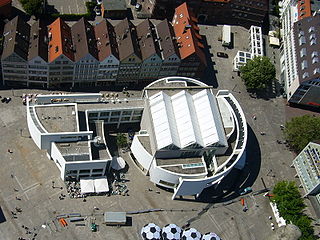
The Stadthaus Ulm is in the centre of Ulm (Germany), located on the Münsterplatz. Primarily, the building is used to present exhibitions of photography and modern and contemporary art. A lecture hall is used for a variety of events, activities, and workshops, including a festival of modern music. It houses the city's tourist information centre and other public services on the ground floor. A permanent exhibition of the archaeology and history of the Münsterplatz is located on the lower level.

Theater Regensburg is a theatrical organization that produces operas, musicals, ballets, plays, and concerts in Regensburg, Germany. The organization operates several performance venues throughout the city.
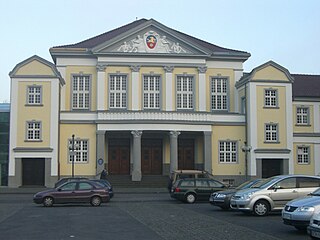
The Festhalle Viersen is a performance space in Viersen, a town located in the Lower Rhine region of Germany. It is well known for its theater and concert programme and is also the annual venue of the UMB World Three-cushion Championship of national teams as well as of the annual international Jazz Festival.
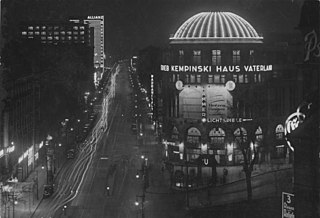
Haus Vaterland was a pleasure palace on the south-east side of Potsdamer Platz in central Berlin. Preceded by Haus Potsdam, a multi-use building including a large cinema and a huge café, from 1928 to 1943 it was a large, famous establishment including the largest cafe in the world, a major cinema, a large ballroom and numerous theme restaurants, promoted as a showcase of all nations. It was partially destroyed by fire in World War II, reopened in a limited form until 1953, and was finally demolished in 1976.
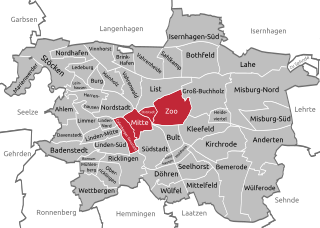
Mitte is the first borough of Hanover, the state capital of Lower Saxony. As of 2020, it has 36,645 inhabitants and consists of the quarters Mitte, Calenberger Neustadt, Oststadt and Zoo. The district mayor is Cornelia Kupsch (CDU).

The Ufa-Palast am Zoo, located near Berlin Zoological Garden in the New West area of Charlottenburg, was a major Berlin cinema owned by Universum Film AG, or Ufa. Opened in 1919 and enlarged in 1925, it was the largest cinema in Germany until 1929 and was one of the main locations of film premières in the country. The building was destroyed in November 1943 during the Bombing of Berlin in World War II and replaced in 1957 by the Zoo Palast.

Theater Rigiblick or Theatersaal Rigiblick is a theatre in the German-speaking Switzerland situated in Zürich-Oberstrass. Built in 1901 as the restaurant Rigiblick, the theater houses mainly guest performances, focussed on the dance theater. The theatre as institution is owned by the government of the city of Zürich, and the building by the Zürcher Frauenverein (ZFV) cooperative.

Städtische Bühnen Frankfurt is the municipal theatre company of Frankfurt, the largest city of Hesse Germany. The name dates back to 1919. The company is structured today in two organisations, Oper Frankfurt for opera, and Schauspiel Frankfurt for drama (Schauspiel).

The Musikalische Komödie is an operettas and musicals theatre in Leipzig. Its venue is located in the Lindenau district in the Haus Dreilinden, which is often referred to as the "Musical Comedy" itself. It is one of the three sections of the Oper Leipzig. However, it has its own ensemble with soloists, choir, ballet company and orchestra. Because of this and its own venue, it is perceived by the public as an independent cultural institution. Its repertoire ranges from Spieloper to operetta and musicals.

The Theater am Aegi is an event venue on Aegidientorplatz square in Hannover, the capital of Lower Saxony, Germany. Like the square, it is often referred to as Aegi. The building was opened in 1953 mainly as a cinema, with a versatile stage also for other performances. It has been a Gastspieltheater for local and touring companies, without its own personnel. After a fire, it was rebuilt as a theatre only, opened in 1967, and then mainly as a venue for drama performances of the state-run Staatstheater Hannover. After a new theatre was built for that company in 1992, Theater am Aegi returned to its traditional role of a venue for various events, including congress, private functions and representation of the city.
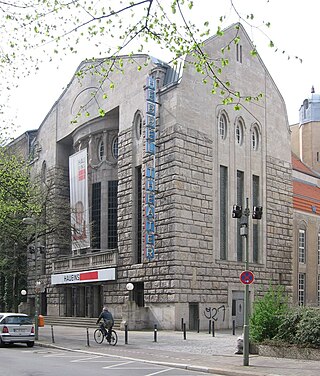
The Hebbel-Theater is a historic theatre building for plays in Berlin-Kreuzberg, Germany. It has been a venue of the company Hebbel am Ufer (HAU) from 2003.

The Hans Otto Theatre, named after the actor Hans Otto, is a municipal theatre in Potsdam in Germany. Its headquarters and main venue is in the Großes Haus am Tiefen See in Potsdam's cultural district on Schiffbauergasse. Other regular venues are the neighbouring historic Reithalle and occasionally the Palace Theatre in the Neues Palais.

The Regensburg satellite camp, also known as the Colosseum subcamp in the vernacular at the time, was established in 1945 as the last subcamp of the Flossenbürg concentration camp in the Regensburg inn the Kolosseum. The Regensburg subcamp was in operation from March 19, 1945, until April 23, 1945. The Colosseum building is located at Stadtamhof 5, approximately 200 meters north of the Danube across the Stone Bridge from the Altstadt.
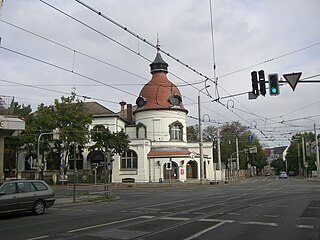
Karl-Heine-Strasse is a radial road in the west of Leipzig marking the boundary between the current boroughs of Leipzig-Plagwitz and Leipzig-Lindenau . 2.01 km (1.2 mi) long, it is named after the industrialist Karl Heine.






















